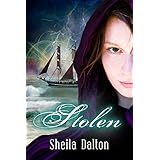An exploration of a nightmare
As a child I was plagued by a pervasive fear of something horrible happening to my mother. In my nightmares, I would come home to a demolished apartment to find my mother gone. If my mom was running late from work, or if the windows were dark, or if she did answer the phone on the first ring, my imagination would get the best of me. My mom would scoff at my fears, "What, you think I got kidnapped and sold into slavery?" Well, guess what? For the heroine of Sheila Dalton's genre-transcendent novel Stolen this scenario is more than just what night terrors are made of - for her it becomes reality. After a routine trip to the market, she comes home to find her native village ravaged and the inhabitants enslaved. In literature, the scenario of a parent looking for a missing child is explored quite frequently. You don't see as much of the reverse - when a child is looking for his/her parents.
The global landscape of slavery
I applaud the author for highlighting the subject of Christian white slavery in a Muslim country. I know it's very popular and politically correct to demonize the infamous Christian White Male as the enslaver of the world. I'm sure there are some people there who'll tell you that it was the white man who invented slavery. It's really refreshing to see a more balanced picture. Don't get me wrong, there are some very graphic scenes of the Senegalese being chained up and shipped to Morocco. But there are equally graphic accounts of white paupers in England being rounded up and shipped off to the Colonies to work on plantations, and white women being used for breeding "super slaves". Avarice and cruelty know no color.
Beyond genre
I am grateful that the novel is not a swashbuckling pirate tale, nor is it a swoonworthy romance, nor is it a combination of the two. Genre fiction puts the expected plot elements above psychological authenticity. Sheila Dalton's work is a cut above genre fiction.
A study of moral ambivalence
I am also grateful to the author for sparing me, the reader, scenes of melodramatic moral agony, of hair-pulling and chest-beating. The young heroine is refreshingly practical and in touch with her survival instinct. In order to stay alive, she does certain things that contrary to the mainstream teachings of her church - oh, like sex outside marriage, stealing and killing. One by one, she breaks those barriers, experiencing only mild moral discomfort. A less seasoned author might have been tempted to play up the internal conflict. What I got out of this is that we are all whores, thieves and murderers. We can repress those vices to some extent, but if put in a certain environment and forced to choose between our principles and survive, we will most likely choose the latter. The philosophical musings are woven seamlessly into the plot and do not stick out. The characters do not become talking heads for various ideologies.
The only thing I struggled with was Lizbet's repeated allegation that she was "not in love" with either one of the two men she had been intimate with. Her ongoing trail of thought is, "Sure, this guy is kind of interesting, and we have great sex, but it's not love." I have trouble believing that a young girl with limited experience would be able to make that distinction between love and lust. It's something a 35-year old divorcee would be able to identify. Apart from that, the author does not step outside the era.
Overall, "Stolen" is one of the most enjoyable and stimulating books I've read this year.

Hey, hey, hey - it's up! Thanks so much.
ReplyDeleteTweeted! Great post :)
ReplyDeleteI like the concept of this book. It is easy to preach morality but as morals are subject to change based on circumstances, who really has a right to judge
ReplyDeleteBut Danny, the whole point is, people DO judge, and that's what makes it so interesting. I am fascinated by the "science" behind morality.
Delete